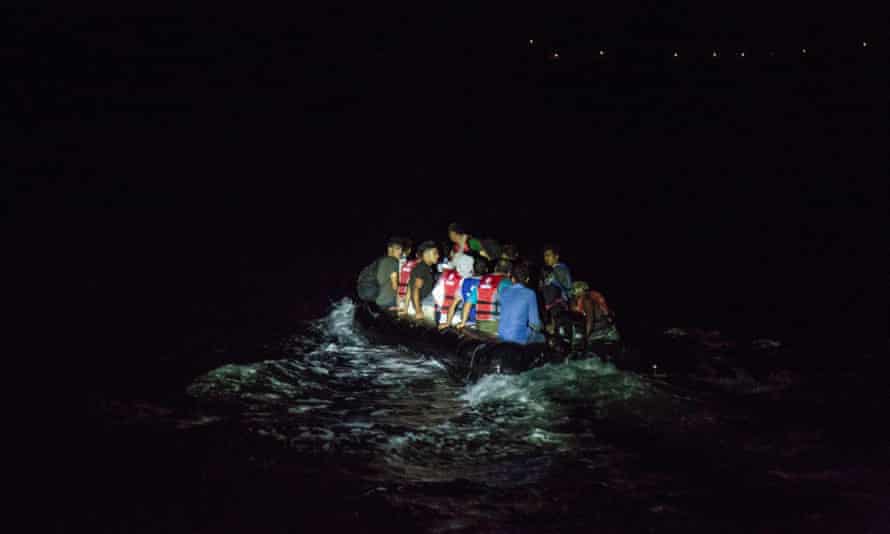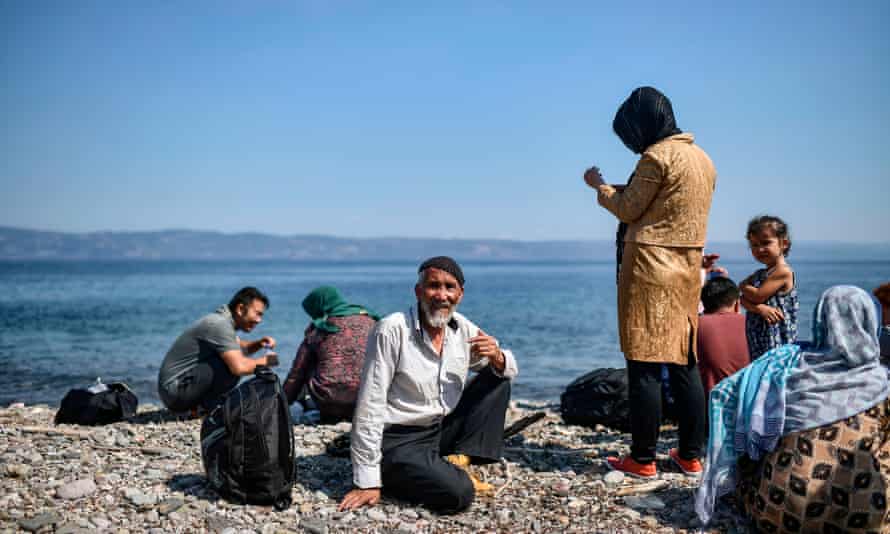Seán Binder is one of the committed humanists who rushed to Greece at the height of the refugee crisis. In other countries and at other times, his idealism could have been celebrated.
But the 27-year-old law student, who has spent the last two years in London, lives in fear. The German-born Irishman and his Syrian friend Sarah Mardini are forced to give up their volunteer work, but for the wrong reasons they are perhaps the most famous helpers in Greece: a criminal investigation has been hanging over their heads for the past three years.
“It is not criminal or heroic to help people in distress,” he tells the Observer. “Legally and morally, it is the right thing to do.”
The activists are accused of human trafficking, money laundering, fraud and espionage – the last charge is based on allegations that they monitored radio channels and coastguard ships in order to obtain advance information about the situation of the smugglers’ boats on Lesbos, the Aegean island at the center of the refugee flows.
In an 86-page report, the police also accused them of being members of a criminal organization posing as an NGO to make a profit by illegally importing people into Greece. The charges followed a six-month police investigation: human rights groups advocating the couple have labeled them “farcical”.
“It was a sword of Damocles,” says Binder. “As absurd as the allegations are, they cast a shadow over your life that makes it impossible to move on.”
He flies to Athens on Sunday before traveling to Lesvos four days later for a trial in which 22 other frontline volunteers are also in the dock – a case that has been described as emblematic of civil society activists across Europe are exposed to unprecedented harassment. This hearing will mark the beginning of a judicial drama that could result in them spending 25 years behind bars.
Refugees from Afghanistan who have just arrived on Lesbos after crossing from Turkey in 2018. Photo: Aris Messinis / AFP / Getty Images
“I’m scared,” Binder readily admits and remembers the 106 days of pre-trial detention before he was allowed to deposit 5,000 euros on bail and leave Greece. “I experienced life in the prison on Chios. It was all scabies and bed bugs with 17 of us packed in a cell. The police detention cells were worse, the most terrible place on earth; rundown, windowless rooms full of asylum seekers just because the authorities couldn’t put them anywhere else. “
Binder was released on December 5, 2018. Hours later, Mardini, who also volunteered at the now defunct Emergency Response Center International, was released from Korydallos prison in Athens, Greece’s toughest prison. She was 23 years old at the time.
Mardini had become famous three years earlier and saved fellow refugees from apparently certain death when their rubber dinghy capsized after leaving Turkey. Only three of the 20 people on board could swim. Sarah and her sister Yusra, a competitive swimmer who would later compete in the Rio Olympics, jumped into the sea and pushed and pulled the boat until it reached Lesbos – a performance featured in a Netflix drama by British director Stephen. Daldry should be immortalized and should appear next year.
Thursday’s trial focuses on allegations of espionage and unlawful use of radio frequencies – considered an offense under Greek law and punishable by up to eight years in prison.
Despite wanting to attend, Mardini learned on Friday that she would be tried in absentia after a judge refused to temporarily lift a seven-year travel ban that prevented her from re-entering Greece. As a non-EU citizen, she is considered to be at fault for public safety.
“The investigation into the crimes associated with longer sentences is still ongoing,” said Zacharias Kesses, the lawyer who heads the activists’ legal department in Athens. “This week they will be tried on unsubstantiated accusations of using WhatsApp’s encrypted application to disseminate information about migrant flows.” This is an extraordinary allegation, he says, when the data was publicly available and known to the port police.
Given the gravity of the allegations, his legal team has reached out to the US and UK bar associations for advice. “Both of them studied the case file and came to the conclusion that there was no legal basis for the allegations, that they were aimed at deterring volunteers rather than an honest response to evidence of crime.”
Aid workers, Kesses said, are “easy targets” on frontline islands where massive local pressure has been exerted on NGOs widely seen as incentives for refugees to cross over from Turkey. “Some of the charges go back to 2016, when neither Seán nor Sarah were in Greece,” said the lawyer. “It’s that absurd.”
 A rubber dinghy was intercepted off Lesvos in 2018. Photo: NurPhoto / Getty Images
A rubber dinghy was intercepted off Lesvos in 2018. Photo: NurPhoto / Getty Images
Hundreds of volunteers have left the country fearing they might be next. Amnesty International regards the impending case as “particularly symbolic” at a time when not only has the climate become more hostile to NGOs, but Greece itself is in the line of fire for allegedly pushing back asylum seekers to its increasingly militarized country and sea borders.
“Human rights defenders across Europe are being criminalized and taken to court for helping refugees and migrants in need,” said Giorgos Kosmopoulos, a Brussels-based activist with a group that will oversee the trial. “Sarah and Seán should be role models for our societies, but instead risk spending the best years of their lives behind bars for simply doing the right thing.”
On Monday, a solidarity rally in front of the Greek parliament called for the charges to be dropped.
Binder, a trained diver before taking up law school, credits his origins with his desire to make the world a better place. His father was a Vietnamese refugee who fled to Germany after the fall of Saigon, where he met Seán’s mother; his two grandmothers, “the first out couple in the west of Ireland”, did a lot of voluntary work.
If he has hope, it is for “graduation” so that he can get on with his life. But he’s also pragmatic.
“I didn’t buy a return ticket,” he says. “It could be over in a matter of hours. It could take months. We could be locked up. I just know that anything can happen at this point. “
https://www.theguardian.com/world/2021/nov/14/on-trial-for-saving-lives-the-young-refugee-activist-facing-a-greek-court












/cloudfront-us-east-2.images.arcpublishing.com/reuters/JEUL2B5V7BJCFMRTKGOS3ZSN4Y.jpg)



/cloudfront-us-east-2.images.arcpublishing.com/reuters/DYF5BFEE4JNPJLNCVUO65UKU6U.jpg)

/cloudfront-us-east-2.images.arcpublishing.com/reuters/UF7R3GWJGNMQBMFSDN7PJNRJ5Y.jpg)












